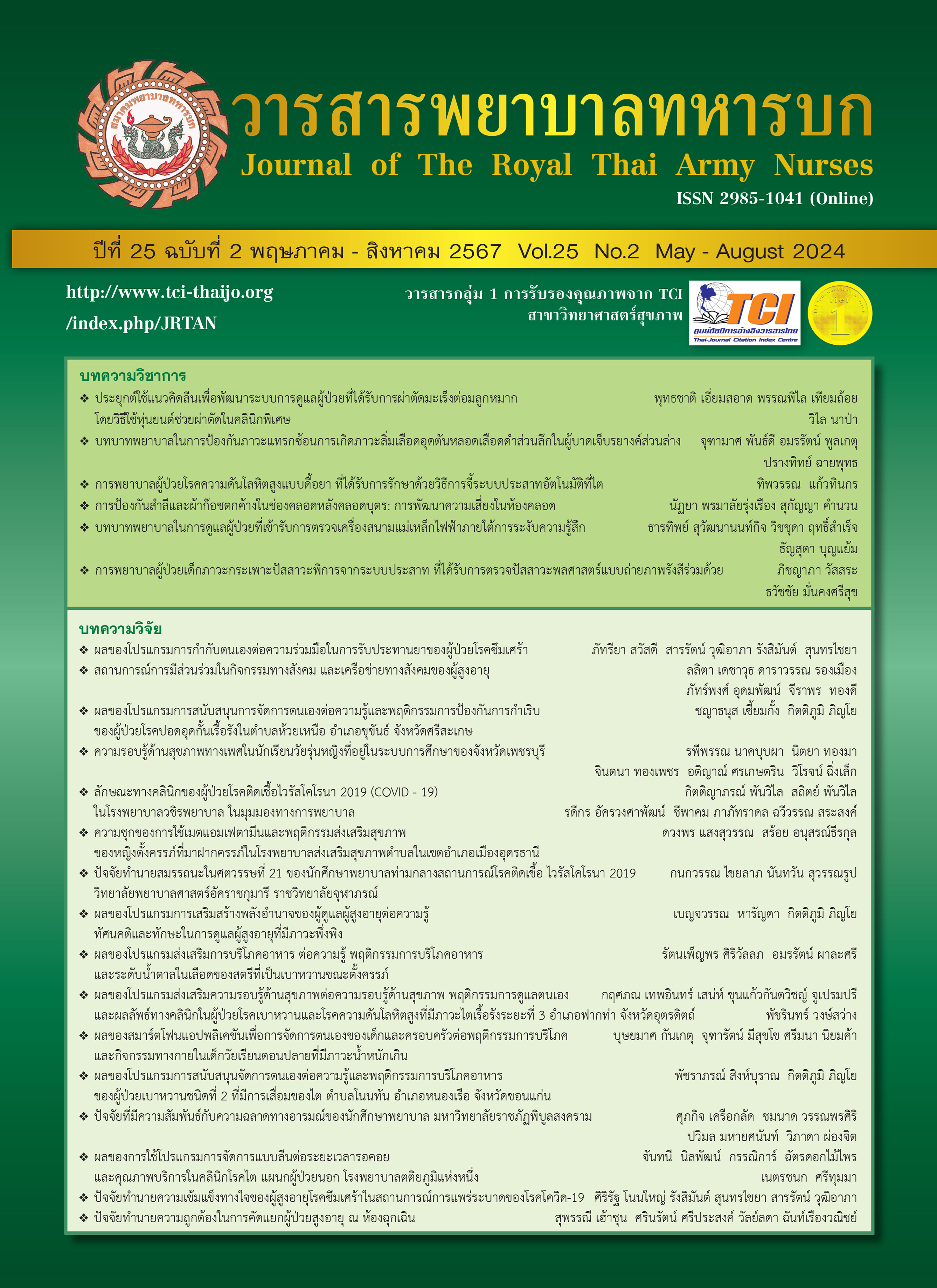Effects of a Smartphone Application for Children and Family Self-Management on Eating and Physical Activity Behaviors Among Overweight Late School-Aged Children
Keywords:
Overweight, Self-management, Eating behavior, Physical activity, Smartphone applicationAbstract
This quasi-experimental design aimed to study the effects of a smartphone application for children and family self-management on eating and physical activity behaviors. The sample were 60 late school-aged children aged between 10-12 years old. The sample was divided into experimental and control groups, with 30 participants in each group. The experiment group participated in the smartphone application for children and family self-management. The research instruments were 1) a smartphone application for self-management of children and families; 2) a general information questionnaire; 3) an eating behavior questionnaire; and 4) a physical activity questionnaire. The Reliability of the questionnaire were .95 and 1.00 respectively. The data were analyzed by descriptive and t-test statistics.
The results showed that the mean score for eating behavior among overweight late school-aged children after using the application was statistically significantly higher than before using the application and statistically significantly higher than those who did not use the application (p<.01). The mean score for physical activity behavior among overweight late school-aged children after using the smartphone application showed no significant difference compared to before using the application and there was also no significant difference compared to those who did not use the application (p>.05). The application can be used to modify eating behavior and long-term studies should be conducted to observe changes in physical activity behavior.
Downloads
References
Kang M. The adiposity rebound in the 21st century children: meaning for what. Korean Journal of Pediatrics. 2018;61(12):375-80.
Orsso C, Ramirez E, Field C, Madsen K, Prado C, Haqq A. Adipose tissue development and expansion from the womb to adolescence an overview. Nutrients. 2020;12(9):2735.
Somsub S. Health literacy for weight management in overweight abd obese school aged children. Regional Health Promotion center 9 Journal. 2018;12(29):20-33. (in Thai).
Yanez-Ortega J, Arrieta-Cerdan E, Lozano-Alonso J, Costa M, Gutierrez-Araus A, Cordero-Guevara J. Prevalence of overweight and obesity in child population a study of a cohort in Castile and Leon Spain. Endocrinologia Diabetes Nutricion. 2019;66(3):173-80.
Aekplakorn W. The National Health Examination Survey 2019-2020.1st ed. Thailand: Aksorn graphic and design; 2021. (in Thai).
Buasri S, Thipsungwan K, Suntranon A. Food consumption behavior fruits vegetables among school-aged children in Chiang rai province. Nursing Journal. 2020;47(2):24-36. (in Thai).
Egan CA, Webster CA, Beets MW, Weaver RG, Russ L, Michael D, et al. Sedentary time and behavior during school: a systematic review and meta-analysis. American Journal of Health Education. 2019;50(5):283–90.
Grao-Cruces A, Sánchez-Oliva D, Padilla-Moledo C, Izquierdo-Gómez R, Cabanas-Sánchez V, Castro-Piñero J. Changes in the school and non-school sedentary time in youth: the UP&DOWN longitudinal study. Journal of Sports Sciences. 2020;38(7):780–6.
Katewongsa P, Pongpradit K. Regenerating physical activity in Thailand after COVID-19 pandemic. 2nd ed. Thailand:Pabpim; 2020. (in Thai).
Csige I, Ujvárosy D, Szabó Z, Lorincz I, Paragh G, Harangi M, et al. The Impact of Obesity on the cardiovascular system. Journal of Diabetes Research. 2018;3(1):1-12.
Ouakinin S, Barreira D, Gois C. Depression and obesity integrating the role of stress neuroendocrine dysfunction and inflammatory pathways. Front Endocrinol. 2018;9(1):431.
Sagar R, Gupta T. Psychological aspects of obesity in children and adolescents. The Indian Journal of Pediatrics. 2018;85(7):554-9.
Alfaleh G, Huffman FG, Li T, Vaccaro JA. Child obesity prevention intervention in Kuwaiti summer camps targeting health behaviors in nutrition, physical activity, and screen time. Journal of Health Science and Medical Research. 2021;39(2):85-99.
Chukaew O, Jittanoon P, Buapeth A. Effect of nutritional self-management program on food consumption behavior and body weight of obese upper-primary school children. Songklanagarind Journal of Nursing. 2016;36(1), 69-86. (in Thai).
Chaisri J, Klungtumneim K, Buajarean H. Clinical nursing practice guideline for management of obesity in children: the Synthesis of Thesis. Journal of The Royal Thai Army Nurses. 2014; 15(2):360-67. (in Thai)
Olfert M, Hagedorn R, Leary M, Eck K, Shelnutt K, Byrd-Bredbenner C. Parent and school-age children’s food preparation cognitions and behaviors guide recommendations for future interventions, Journal of Nutrition Education and Behavior. 2019;51(6):684-92.
Ryan P, Sawin K. The individual and family self-management theory: Background and perspective on context, process and outcomes. Nursing Outlook. 2009;57(4):217-25.
Burns N, Grove S. The practice of nursing research: Appraisal, synthesis and generation of evidence. 6th ed. Saint Louis:Saunders Elsevier; 2009.
Srisatidnarakul B. The methodology in nursing research. 5thed. Thailand:U&I Intermedia; 2010.
Srithanya S, Thongbai W, Kummabutr J. The effects of a planned behavior program on the eating and physical activity behaviors of overweight late primary school-aged children. Journal of Nursing Science. 2019;31(1):85-97. (in Thai).
Saeloo J, Wiriyasirikul N. The relationship between health literacy and obesity prevention behaviors of school age children with overweight and obesity in schools under primary educational service area office Mueang district Nakhon Si Thammarat province. Journal of MCU Nakhondhat. 2020;7(11);1-15. (in Thai).
Baker S, Morawska A, Mitchell A. Promoting children’s healthy habits through selfregulation via parenting. Clinical Child and Family Psychology Review. 2019;22(1):52-62.
No-in K. Overweight and obesity among Thai school-aged children and adolescents. The Journal of The Royal Thai Army Nurses. 2017;18 (Suppl) 1:1-8. (in Thai).
Zhang Y, Guo Z, Zhang W, Li Q, Zhao Y, Wang Z, et al. Effect of acute PM 2.5 exposure on lung function in children: A systematic review and meta-analysis. Journal of Asthma and Allergy. 2023;16(1):529-40.
Yun HJ, Kim HS. Self-management behaviors of children with spina bifida. Journal of Neuroscience Nursing. 2017;49(1):15-21.
Lerret S, White-Traut R, Medoff-Cooper B, Simpson P, Adib R, Ahamed S. Pilot study protocol of a mHealth self-management intervention for family members of pediatric transplant recipients. Research in Nursing & Health. 2020;43(2):145-54.
Downloads
Published
How to Cite
Issue
Section
License
Copyright (c) 2024 Journal of The Royal Thai Army Nurses

This work is licensed under a Creative Commons Attribution-NonCommercial-NoDerivatives 4.0 International License.
บทความหรือข้อคิดเห็นใดใดที่ปรากฏในวารสารพยาบาลทหารบกเป็นวรรณกรรมของผู้เขียน ซึ่งบรรณาธิการหรือสมาคมพยาบาลทหารบก ไม่จำเป็นต้องเห็นด้วย
บทความที่ได้รับการตีพิมพ์เป็นลิขสิทธิ์ของวารสารพยาบาลทหารบก
The ideas and opinions expressed in the Journal of The Royal Thai Army Nurses are those of the authors and not necessarily those
of the editor or Royal Thai Army Nurses Association.






